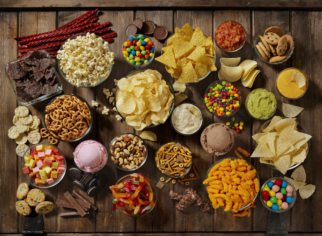Is Snacking Causing You to Gain Weight?
December 27, 2021

Snacking could very well be the reason you are not losing weight or why you are gaining weight.
Before diving in let’s look at what I mean by snacking.
There are two types of snacks, one is a planned smaller meal in-between your bigger meals. This type of snack is very common and often prescribed by dietitians or nutrition coaches as a small amount of particular food eaten between meals that will fit in with your overall diet plan. It has the purpose of spreading your macronutrients over the day to help with nutrient intake and keep you satiated (feeling full). This type of snacking can be very beneficial and help with weight loss.
The second type of snacking is the grazing type, it is careless snacking. It is unplanned and results in a person continuously reaching for a small amount of food throughout the day. This type of snacking arises when people tend to eat due to boredom, happiness, habit, stress, or even frustration and are in an environment that allows it. This snacking is a problem.
Frequent snacking like this will likely cause an individual to consume more daily calories, much more, placing them in a calorie surplus which results in excess weight and an increase in negative health consequences.
Careless snacking (grazing) can add as many as 500-750 calories to your total daily calorie consumption. In addition to these extra calories, another concern with careless snacking is that it is shown to have no impact on the size of your main meals. You will not eat less at lunch or dinner if you graze throughout the day. Snack like this regularly and the likely result will be a weight gain.
How can we stop careless snacking (grazing)? As I mentioned, grazing throughout the day will become a habit developed through things like boredom, stress, happiness, and frustration. Knowing what behaviours are the trigger can help address the situation, by adding in a new behaviour each time you go to reach for the snack.
Before this though, the first step would be to look at your environment, are the snack foods easily available? If so, they need to be eliminated, as you have created an environment that is encouraging snacking by simply having the foods available.
The second strategy is addressing the mood/behaviour that triggers the snacking, once you know what is triggering the impulse to snack then try replacing it with another positive behaviour. For example, if you find yourself reaching for a snack change this up by reaching for a glass of water.
Share This Story, Choose Your Platform!
Is Snacking Causing You to Gain Weight?
December 27, 2021

Snacking could very well be the reason you are not losing weight or why you are gaining weight.
Before diving in let’s look at what I mean by snacking.
There are two types of snacks, one is a planned smaller meal in-between your bigger meals. This type of snack is very common and often prescribed by dietitians or nutrition coaches as a small amount of particular food eaten between meals that will fit in with your overall diet plan. It has the purpose of spreading your macronutrients over the day to help with nutrient intake and keep you satiated (feeling full). This type of snacking can be very beneficial and help with weight loss.
The second type of snacking is the grazing type, it is careless snacking. It is unplanned and results in a person continuously reaching for a small amount of food throughout the day. This type of snacking arises when people tend to eat due to boredom, happiness, habit, stress, or even frustration and are in an environment that allows it. This snacking is a problem.
Frequent snacking like this will likely cause an individual to consume more daily calories, much more, placing them in a calorie surplus which results in excess weight and an increase in negative health consequences.
Careless snacking (grazing) can add as many as 500-750 calories to your total daily calorie consumption. In addition to these extra calories, another concern with careless snacking is that it is shown to have no impact on the size of your main meals. You will not eat less at lunch or dinner if you graze throughout the day. Snack like this regularly and the likely result will be a weight gain.
How can we stop careless snacking (grazing)? As I mentioned, grazing throughout the day will become a habit developed through things like boredom, stress, happiness, and frustration. Knowing what behaviours are the trigger can help address the situation, by adding in a new behaviour each time you go to reach for the snack.
Before this though, the first step would be to look at your environment, are the snack foods easily available? If so, they need to be eliminated, as you have created an environment that is encouraging snacking by simply having the foods available.
The second strategy is addressing the mood/behaviour that triggers the snacking, once you know what is triggering the impulse to snack then try replacing it with another positive behaviour. For example, if you find yourself reaching for a snack change this up by reaching for a glass of water.


